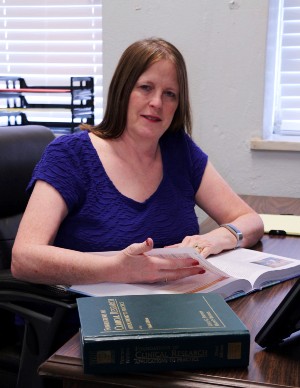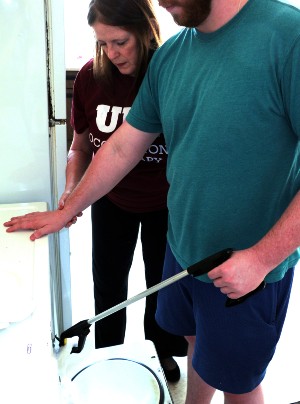
JoEllen Showers wanted a new educational adventure.
After earning two bachelor’s degrees — the first in elementary and special education, and the second in occupational therapy — and a master’s degree in exercise science, all in a traditional classroom setting, Showers decided to do something different. She enrolled in the Doctor of Education, Curriculum & Instruction online program at the University of Louisiana Monroe and is enjoying the flexibility it offers.
“I have more freedom being in an online program where I can study at my own pace late at night or early in the morning,” Showers said.
The program is already paying off for her.
“In August 2019, I was offered a full-time teaching position in the Master of Occupational Therapy (MOT) Program at ULM,” she said. “While teaching, I will continue to work on my Ed.D. program, which I intend to complete in 2021. Having the opportunity to combine my two passions, occupational therapy and teaching, is a blessing.”
Showers, who previously taught in the ULM MOT Program as an adjunct, wanted to continue her association with the university, which made ULM a natural choice for her doctoral program.
“Occupational therapy and teaching are both my passion, and I feel like that’s where I should be,” she said. “Since this degree is in Curriculum & Instruction, it gives me the opportunity to learn about what is required when developing curriculum.”
Developing a Rapport
In her work as an occupational therapist, Showers helped patients learn skills that improve their quality of life.
“If a patient is unable to use one arm after having a stroke, we teach that person a new way to put on a shirt as independently as possible,” she said.
Showers has found that the skills necessary for building an empathetic relationship with patients are also required for teaching.
“As a therapist, you want to be able to obtain the information and develop a rapport with your patients so they don’t become defensive or upset or misinterpret anything you might say,” she said. “The same thing goes with students. We want to be able to interact and communicate with our students without them misinterpreting what is said.”
Showers points to CURR 7008: Communication & Collaboration in Problem Solving, in the online Ed.D. program for helping her connect the dots between her two passions.
“We talked about different personalities and different ways of interacting,” she said. “You can show that you’re interested and want to help in a professional manner without causing any misunderstanding.”
Learning these nuances in communication has been helpful for Showers to practice both face to face and online.
“When you’re communicating online, people can’t see the nonverbal information,” she said. “It’s all written, so you have to be very careful in how you write things so they don’t misinterpret it.”
In addition to enhancing soft skills in the online program, Showers has learned how to interpret research and statistics, knowledge she considers vital for her work as an educator.
“[CURR 7002]: Applied Statistical Analyses has been helpful because we have a lot of research articles to read in this Ed.D. program,” she said. “I need to feel more knowledgeable and more comfortable with that information to be able to teach students.”
While Showers plans to apply these skills to teaching college-level classes, she confirmed that the courses are good for any teacher. “If you’re a teacher, these courses apply to any level, K through 12, community colleges or universities,” she said. “It’s a great opportunity to learn a lot of life skills.”
Investing the Time

Pursuing a doctorate online isn’t easy. It takes long hours, and Showers finds it can be quite stressful at times.
“I know that there’s a light at the end of the tunnel when I finish, so I don’t mind the stress,” she said. With the classes she has left and a dissertation to complete, she expects to graduate in 2021.
Thankfully, she has the support of her husband David and her three sons Daniel (26), Thomas (24) and Ryan (23). Her youngest is starting his senior year at ULM and studying to be a radiologic technologist. Being able to observe her son’s experience as a college student is helping her augment the insights she is gaining in her online classes.
There is a learning curve for students who have never taken classes online, but Showers said navigating the program is easy once you get the hang of it.
“Aside from learning the material, it does take a little bit to get used to the system of working online and the process of doing things,” she said. “You have to be prepared for that — doing several new things at the same time.”
Showers finds that finishing each online course in under two months helps her manage the amount of studying required and makes the program go fast.
“You have to be willing to invest the time to do the reading and the writing, and it is quite a bit,” she said. “Things go quickly when you invest your time to do it. It is stressful while you’re taking the courses, but it’s worth it in the end when you finish in eight weeks, earn three hours of credit, and receive your grade. I find that rewarding.”
The real reward for Showers is in the education itself.
“Lifelong learning is part of the occupational therapy philosophy and I believe we always need to remember that when working with patients, and we instill that in our students,” she said. “This Ed.D. program has been beneficial for me to learn and to continue to grow. This is a great program where you learn to be a lifelong learner.”
Learn more about ULM’s Doctor of Education, Curriculum & Instruction online program.
